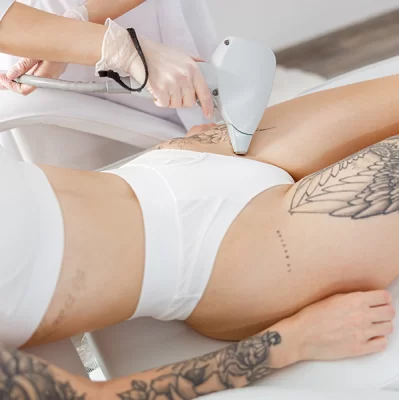Laser hair removal and tattoo
- Laser hair removal and tattoos: basic information
- Is a tattoo a contraindication for laser hair removal?
- The effect of laser on a tattoo
- The risk associated with laser hair removal on a tattooed area
- How to protect a tattoo during laser hair removal?
- Laser hair removal and changes in the appearance of a tattoo
Laser hair removal near a tattoo requires special attention. The laser used for hair removal during this procedure can interact with the pigments in the tattoo. While the laser energy is mainly absorbed by the melanin in the hair, the impact on the tattoo pigments cannot be overlooked.
Tattoos pose some challenges for laser hair removal, but it doesn't mean you have to avoid these treatments. Proper preparation and protection of the tattooed area before the procedure are crucial in significantly reducing the risk of skin damage.
If you are considering laser hair removal near or directly on a tattoo, consult with a specialist. The expert will assess the condition of your skin and advise on the optimal and safe way to proceed with the treatment, ensuring the safety of both your skin and the tattoo.
A tattoo is not an absolute contraindication for laser hair removal, but its presence requires special caution during the procedure. The biggest danger is directing the laser directly onto the tattoo, which can lead to burns and damage to both the skin and the design. Therefore, during the procedure, it is necessary to avoid areas with tattoos or use special protective covers.
Laser hair removal causes the absorption of energy by the melanin in the hair, which can also affect the pigments in the tattoo. This can result in fading of the color or even total disappearance of the design in areas exposed to the laser. Excessive exposure to laser energy during treatments can cause side effects such as skin redness or blistering.
In the case of large tattoos on areas undergoing hair removal, avoiding those areas becomes necessary. It is also important to consult with an experienced specialist before starting the procedure. The professional will assess the skin condition and advise on how to perform laser hair removal without harming the tattoo.
Remember to also consider other contraindications for laser hair removal, such as chronic illnesses, sunburn, or skin infections. Avoid these types of treatments during pregnancy and breastfeeding, and inform the specialist about any medications and herbal supplements you may be taking.
Laser hair removal can affect tattoos because the laser light is absorbed by the pigments in the skin. While the energy usually targets the melanin in the hair, it can also impact the tattoo pigments. This can result in changes to the appearance of the tattoo, such as discoloration or fading of the design. This happens because the tattoo pigments react to the laser similar to melanin. The risk of damaging the design is higher when the laser beam directly hits the tattooed area.
Laser hair removal on tattooed skin comes with some risks. Primarily, there is a possibility of lightening or changing the color of the tattoo itself. Tattoo pigments absorb laser energy, sometimes leading to partial disappearance of the design.
Additionally, irritations and burns can occur on the tattooed skin. The laser increases skin sensitivity, making it more susceptible to damage or infections. Scabs that form after the procedure may detach, damaging the tattoo and creating gaps.
Especially at risk are tanned skin or darker tattoos. Dark pigment absorbs laser energy more intensely, increasing the risk of redness or blisters.
To reduce the risks associated with laser hair removal, it is advisable to avoid directing the laser directly onto tattooed areas and to use special protective covers during the procedure.
Check out the differences between laser epilation and depilation.
Protecting a tattoo during laser hair removal is crucial to avoid damage to both the skin and the tattoo itself. There are several effective ways to protect a tattoo from the laser's effects:
- Using white chalk that effectively reflects the laser beams, reducing their impact on the tattoo pigments,
- Applying special protective creams that create a barrier on the skin - protecting it from direct contact with the laser,
- Covering the tattoo with a patch or special dressing, which physically blocks the laser's access to the pigment in the skin.
Properly securing the skin allows for hair removal around the tattoo without risking its damage. A specialist will help choose the safest protection method to preserve the tattoo's longevity and maintain healthy skin after laser hair removal.
Laser rays used during hair removal can affect a tattoo because they are absorbed by the ink pigments. This can lead to lightening or changing the color of the design. Lasers interact with tattoo pigments similarly to melanin in hair, increasing the risk of damaging the tattoo. Changes in the appearance of the tattoo can be irreversible, so protecting it during the procedure is extremely important.
Laser hair removal on areas adjacent to a tattoo increases the risk of discoloration and blurring of the design's contours. It is crucial to use protective measures that will limit the laser's contact with tattoo pigments. Before undergoing laser hair removal near a tattoo, it is advisable to consult with a specialist who can help choose the appropriate protection method to avoid unfavorable changes in the tattoo's appearance.
After laser hair removal, the skin becomes more susceptible to irritation and infections, which can negatively impact the tattoo's aesthetics. Additionally, scabs formed after the procedure can damage the design by peeling off pigment fragments.
To maintain the tattoo's intact appearance, avoid directing the laser directly on the tattooed areas. This way, you can effectively protect both the skin and the tattoo.
